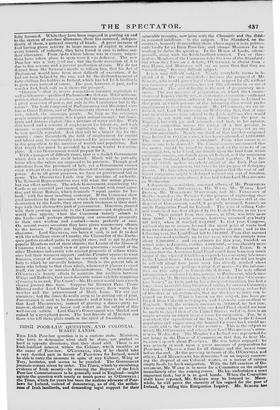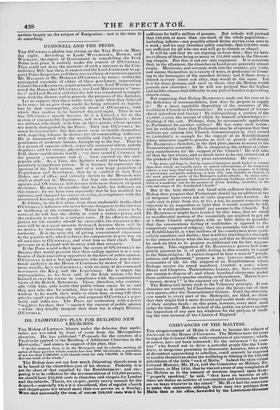IRISH POOR-LAW QUESTION, AND COLONIAL WASTE LANDS.
THIS Irish Poor-law question is in a curious state. Ministers, who have to determine what shall be done, are pushed so hard in opposite directions, that they stand still. There is an Irish-landlord interest within the Cabinet, which trembles at the name of Poor-law. O'Corsasse, who, if he should take a very decided part in favour of Poor-laws for Ireland, would be able to carry the measure in spite of any Cabinet, Whig or Tory, hesitates, and seems to be puzzled. The Government Journals remain silent by order. The Times, which by circulating evidence of Irish misery—by causing the Reports of the Irish Poor-law Commissioners to be generally read in England—might agitate the question with nearly as much power as 0CoNereee ; the Times, which for years has been the zealous advocate of Poor- laws for Ireland, instead of denouncing, as of old, the selfish- 210811 of Irish landlords, and demanding legal support for their miserable tenantry, now joins with the Chronicle and the ITIAbe in assumed Milacron,. to the subject. The Standard, on tite contrary, honestly disregarding, those whose organ it is in 'edifice, calls loudly for an Irish Poor-law, and abuses Ministers for in- tending to shelve the queetien. In the House of Lords. silence prevails, along with the Irish-landlord interest. Two or three eeeleus NIetilbers of the Ceentrions take the tone of' the Standard ; I at wI ll'Im they I; 'we on a debate, O'Com ewes is absent from a thin Houee, and Ministers will emy no more than that they are " considering" the very difficult subject.
Il is a very dillienit subject. Nearly everybody Seems to be afraid id' it. We say everybody ; beeauso the proposal of Mr.
Sr•itoev, who would give a legal claim to support for all, teithout (my ineamres propvintli,m, has sot fifty ad % mimes in or out of
Parliament. The real diflieulty is the cost of preparatory mea- sures. one measure of preparation on which the Commis-
sioners of Inquiry chiefly rely, is s.t stentaticronigration—sufficient etnigration—etniit.iation sufficient for raising Nvages in Ireland to that pint at e bielm pet-stone or the labouring class would prefer enntloyintint to Wl■L IP )1I,;(. support. M r. O'coNNF ti., We are in- formed, told Lord NI Oil Wednesday last, that if sup- Pio in worhhilitses were ufkrcil to the Irish miltions, they would reeeive it, not witlt any feeling of simile.; like the poor in 'England, but %rill' joy and ii tilniihm ; ;Intl that, in his opinion, A./fair/put emigration means the giving of a free passage to the Colonies to 1011,000 families in tii‘, first year,--let us say t;00,000 individuals. Nearly one-third of that number emigrated front Ireland in 1s:32, at a cost, it has been reckoned, or 1,0003M/. The stun required, then, is 3,000,000/. From what source is Si) I arge a stun to be derived ? The Commissioners it:124)11111mnd that. the money should be raisiel by loan, and en the security of on emigration tax, to be levied, onti-ftiurth upon the land frotu which einierants remove, one-fourth upon all and the reniannog hall' upon Scotland. Irelawl, awl England together. It is this pmpesal u Ii cli inalses teerybedy afraid of the Irish Poor-law queetion,---not emigration, but taxes for the pit:pose of defraying' its rust. We have often expre,sedl an opinion that the cost of suf fieient emigration 'nighi he defrayed williont any sort of taxation. That maiiimien is not ours alone; it was laid before Lord MELBOURNE 011 ed neyluv.
A deptitatioe—censistine, a mu ongst others, of Mr. PEREGRINK Cotteiree sv, Mr. ()(oe epee., Mr. Wyse:, Mr. WARD, Lord Devox, Mr. Voiitvcti iV ii mama:, and Mr. FERGUSON of' Raith—waited os the Premier rum the purpose of expressii,ig their deliberate belief that the waste lands or the Colonies still at the dispel I el' Governineut, e ould, if properly- managed. furnish an ample Emigration Fetid for Ireland. The hail of selling Colo- Mal waste laud was tir,t tolvt(.4 by the Ullited States in the yen.
1795. Their receipt from this source, in I 796, was little more than 1000/. The yearly imenne, however, increased gradually till 1s19, when it reached tis2,000/. lit that year, Congress, without rhyme or reason. loaered the upset pi ice of waste land
from two dollars to mie ii .1 and a quarter per acre ; and in the id honing leer, the Lind Fluid fell to :110,000/. From that amount it has increased gradually up to last year, when the receipts were about 2,300,000/.; and an estimate for this year, founded on actual sales in January, reaches 1000,0001., or considerably more than the whole Government expenditure of the Union. It is obvious that the American Land Fund %vould have been very much larger if' tIni wleee of it had been expended ill conveying labourers to the United States. Our own Land Fund (and we did not begin to sell till about four years ago) has already reached about 300,0001. a year; or perhaps a great deal more,--fim the inform:I- til): i un the; subject is leinentebly deficient. The oely official iii filrinet ion is contained in two returns to Parliament, which were inoveil for by :lir. I I urr (who, as t he chief low [der if the'' Coioniza- time) Sovisey" IS:30, and by his subseipteet exertions, has had a hag, share in estelni- hing the plan of selling for ouroa n Colonies); but those returns are se empty of f :els worth knowing, arid so full of blm,ders or ini-stotermoit s, that no, the least romance cart be placed on them. What is lsnown on the subject. has been ga- thered from Colo:dal newspapere, end Colonists now resident ill written largely on the subject of Emigration : now is the time to do something.



























 Previous page
Previous page